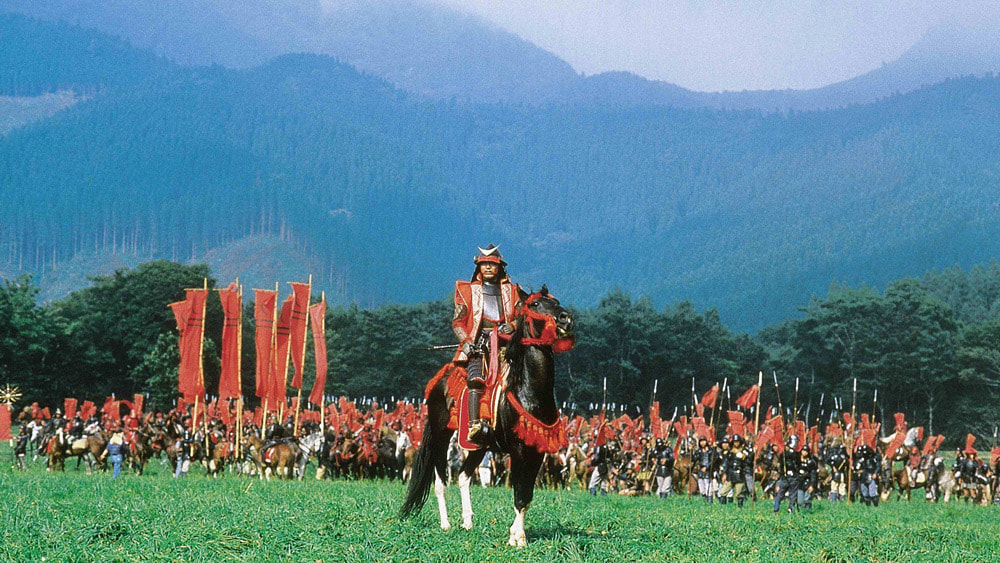The living situation in the prime castle quickly degrades, as Hidetora wants to give up the responsibility of leadership while retaining the trappings of it. The warlord made his life by taking whatever it was he wanted, thus making him terrible at giving things away. Family dinners become hierarchical standoffs, Hidetora’s men clash with Taro’s, and Kaede, like so many others, resents Hidetora for massacring her family and exiling her from her ancestral castle, which just so happens to be the one she’s now living in. She convinces Taro to make his father sign over all his titles and authority, a gesture identical to his previous declaration but wounding to the old man since he’s not the one who initiates it. The blow to his pride sends him packing to Jiro’s castle, but his middle son won’t accept him either, and Taro decrees that any peasants who help the now-nomadic Hidetora will be punished. With nowhere else to go, he squats in the castle that Saburo would’ve been given, but the combined forces of Taro and Jiro arrive to burn him out.
What follows is a breathtaking and bloody siege, a climax for a film that still has a powerful hour left in it. Kurosawa has filmed battles before, particularly in his Macbeth adaptation Throne of Blood, but the scale in Ran puts that film, and pretty much all others, to shame. What seems like hundreds of soldiers, each distinguishable by the flags attached to their belts, charge into a black-soiled courtyard. The sounds of their rifles firing are masked by a pulsing score which suddenly drops out at a striking moment. In keeping with the bloody history of the period, Kurosawa doesn’t skimp on the blood and gore, showing the carnage of warfare in sharp colors amongst dramatic scenes of loss and waste. At the top of the tower sits Hidetora, pushed towards madness by the useless sacrifice of his men but untouched by bullets or blades. The whole sequence ends with him reeling out of the castle in a single take, a devastating end to a man at the height of power only briefly before. It’s one of the most brilliantly filmed warfare sequences put to film, propulsive and coherent and decidedly set in opposition to romanticism or heroism.
Taking a deserved breather from such a high point, Ran continues with a broken Hidetora going on a tour of past atrocities while his sons consolidate power. Kurosawa, who cowrote the script with Hideo Oguni and Masato Ide, expertly paces the film while also calibrating sympathy for Hidetora. The broken old man doddering away from his treacherous sons is the same man who routed families, leaving destruction and trauma in his wake. By confronting him with the magnitude of his crimes at such a low point, the film could’ve felt like piling on, but it instead makes him receptive to hearing dissent, of which there’s plenty. His crimes have such magnitude that his sons have to pay for them, too. The theme of being unable to declare peace on one’s own terms is a potent one, oddly mimicked by Thor: Ragnarok, which I saw a few weeks before. Those who fought for the ability to make such a hubristic decision and those crushed in the achieving of it will have something to say about the story of their lives being recalibrated on a whim.
It’s occasionally difficult to judge acting in a Kurosawa film since it often comes from the Japanese tradition of Noh, with its melodrama and overly expressive makeup. Hidetora is made up in this fashion, especially after his mental break, but with a few exceptions, everyone else is playing things in a naturalistic fashion. Harada’s Kaede distinguishes herself amongst the non-Hidetora cast as the only character who clearly knows what she wants. Other characters are buffeted between loyalty and self-interest and indecision, but Kaede’s laser focus on revenge for her family makes her the smartest person in any given room, and Harada infuses her with an imperiousness that instantly makes characters bow to her will. Even with Hidetora’s theatricality, Nakadai is amazing in the role. He plays the respected leader, the wounded father, and the delirious old man with dignity and pathos, even when the character is undeserving of the former and ashamed of the latter. From a pure physical standpoint, Nakadai’s stumble out of the castle after his total defeat is something to behold.
If Kurosawa thinks Ran is his best film, it’s hard to disagree with the master. Yojimbo is a perfect samurai Western, Rashomon is his most iconic, and the lack of Kurosawa’s muse Toshiro Mfune in Ran makes a difference. However, anyone who exalts Braveheart should watch Ran to see how it’s done. For medieval warfare and power struggles, it’s hard to imagine anyone topping Ran. If this film isn’t Kurosawa’s best, it’s only because he has so many other contenders. A

 RSS Feed
RSS Feed